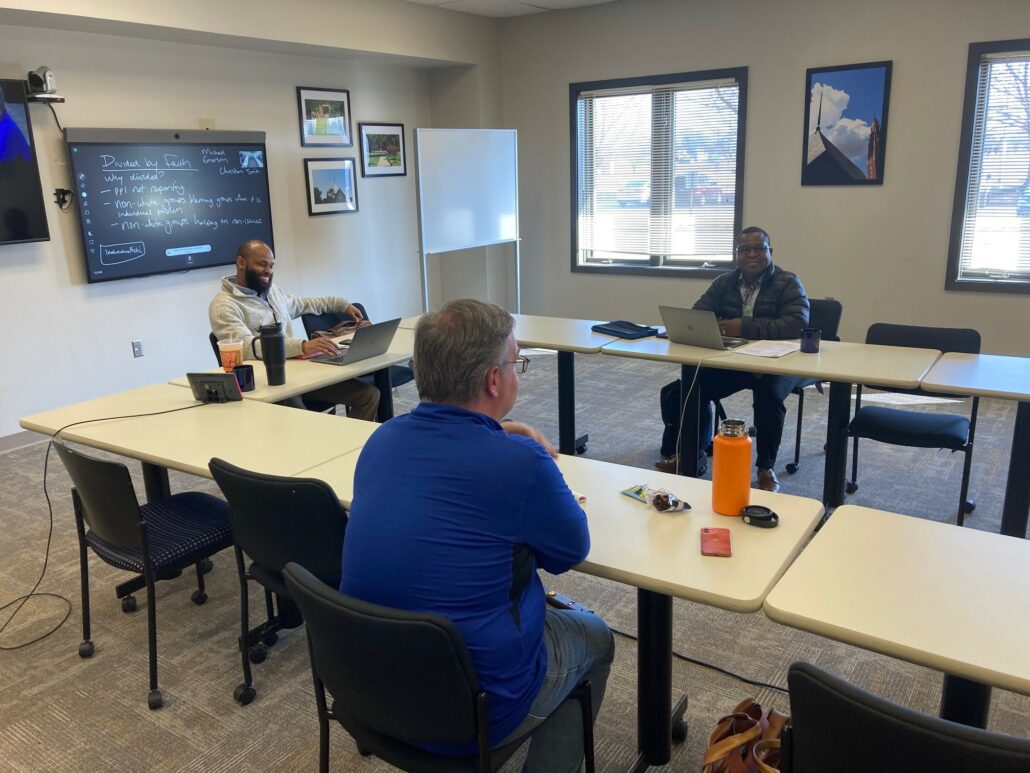
Uplifting the Least of These: A Christian Approach to Economic Justice
“Our current economic system does not follow the teachings of Christ…”
That is a key understanding when drawing a connection between Christian ethics and economic justice, according to Corey Shirey.
Shirey is Executive Director and Campus Minister for the Wesley Foundation at Southwest Oklahoma State University. He is also a student in the Master of Divinity program at Saint Paul School of Theology.
Ethics is a required component of the MDiv curriculum at Saint Paul. Seminary students like Shirey gain a deeper knowledge of the different approaches to Christian moral discernment and judgment in ETH 301, Introduction to Christian Ethics. The course is led by Dr. Joshua Bartholomew, Assistant Professor of Ethics, Church and Society. In addition to his ministry work, Dr. Bartholomew has extensive experience as a community organizer, with a focus on movements for racial and economic justice.
A History of Confronting Poverty
Dr. Bartholomew emphasizes that ministers are called to collaborate with faith and community leaders from diverse backgrounds to address social justice issues.
There is a long history of faith-based leadership when it comes to fighting poverty and other systemic problems. The Poor People’s Campaign, for example, was founded by Dr. Martin Luther King, Jr. and the Southern Christian Leadership Conference to empower those who lacked economic and political power. King strongly endorsed the struggle against poverty as essential for achieving economic and racial justice.
In recent years, the Poor People’s Campaign has re-emerged under the leadership of Rev. William Barber. In the spirit of these examples, Dr. Bartholomew calls upon Black churches and faith leaders to “come together now to organize democratic energies of communities on behalf of ways to build better economic futures.”
Christian Ethics & the Seminary Experience
Shirey points out that our current economic systm incentivizes “modes that abuse the lower economic class” while empowering the rich to keep growing richer.
The goal of ETH 301 is to introduce students to the discipline of Christian ethics in ways that are relevant for pastors, educators and others in Church leadership roles. A Christian ethics approach to economic justice, Shirey continues, means advocating for reforms that empower and lift up “the least of these” to economic freedom.
In addition to examining economic issues, students study approaches to human sexuality and the LGBTQ+ community, as well as immigration. Shirey says the course has also challenged him to understand “the context in which I am doing ministry.”
Faith leaders must understand that different contexts will have different approaches and views when it comes to how faith guides a person’s beliefs. As an example, Shirey observes how his approach to theology concerning human sexuality may be considered progressive in western Oklahoma where he lives, but may be seen as more conservative in other contexts.
Sowing the Seeds of Change One Community at a Time
Dr. Bartholomew posits that the Gospel is something we do, not just something we hear. It is a lifestyle that involves social action for positive change, including movements for economic and racial justice.
Building Awareness
One specific way in which faith leaders can advance ethics and economic justice is to simply “preach and speak up about the issues in their context,” says Shirey.
For example, he points to his own social context of serving a campus ministry in a college town. On campus, through a survey conducted last year, his organization found that “1 in 5 of our students goes to bed hungry.”
However, very few people in the surrounding community were even aware that this issue exists. Sadly, all too many simply do not believe that poverty is a problem on college campuses.
“If more knew about students going hungry,” he says, “I believe there would be more of a movement to fix the systemic issues that cause it in the first place.”
Taking Direct Action
When speaking about the application of Christian ethics, Shirey notes that one can simply look at church-run food banks and the free meals that ministries, like those on college campuses, offer to our communities.
“In my campus ministry,” he notes, “we take our economic ethic to a real personal mode with us actually going out on campus to meet our students and learn their needs.”
Shirey says the Wesley Foundation at SWOSU offers a free dinner every Tuesday night, breakfast on Wednesday mornings, and lunch on Thursday afternoons. Though these missional activities do not work to solve the systemic issues that cause hunger on campus, they do seek to lessen the burden on students by simply ensuring they get at least three meals a week.
Dr. Bartholomew likewise emphasizes the importance of meeting the needs of people in community. In his forthcoming book, Black Theology and the Black Panthers, he addresses the need for faith leaders to build upon the model of ethics left behind by the legacy of the Panthers. Through innovative programs such as free food, progressive healthcare modalities and political education, the Panthers offered a vision of economic justice that meets the people where their needs can be met.
By challenging students to connect the dots between the Good News of Christ and contemporary issues facing our society today, Saint Paul prepares faith leaders to address the needs of their congregations and communities.
If you’re looking to advance your own ministry through seminary education, we encourage you to apply online for admission to one of our degree programs.
You may also call us at 913-253-5084 or send an email to if you have questions about enrollment.

Great article and insights.